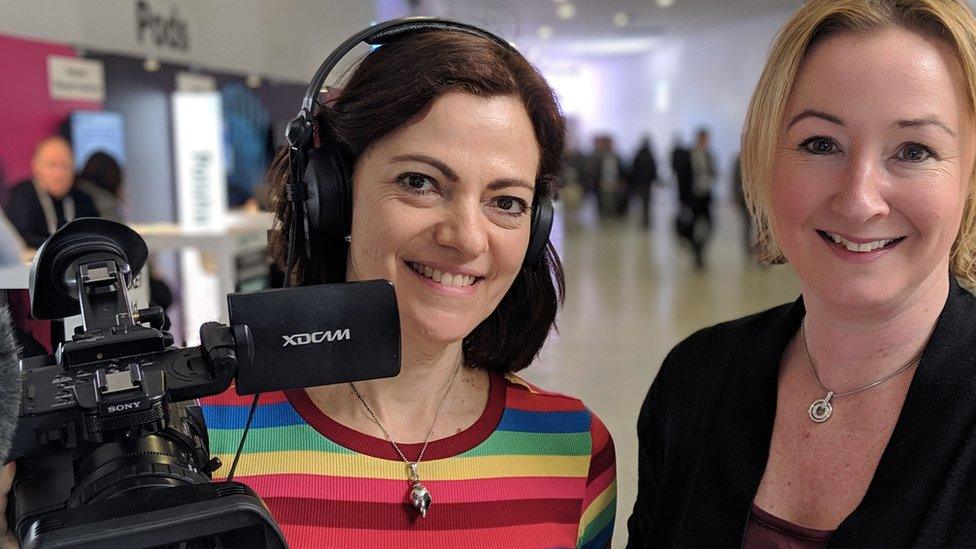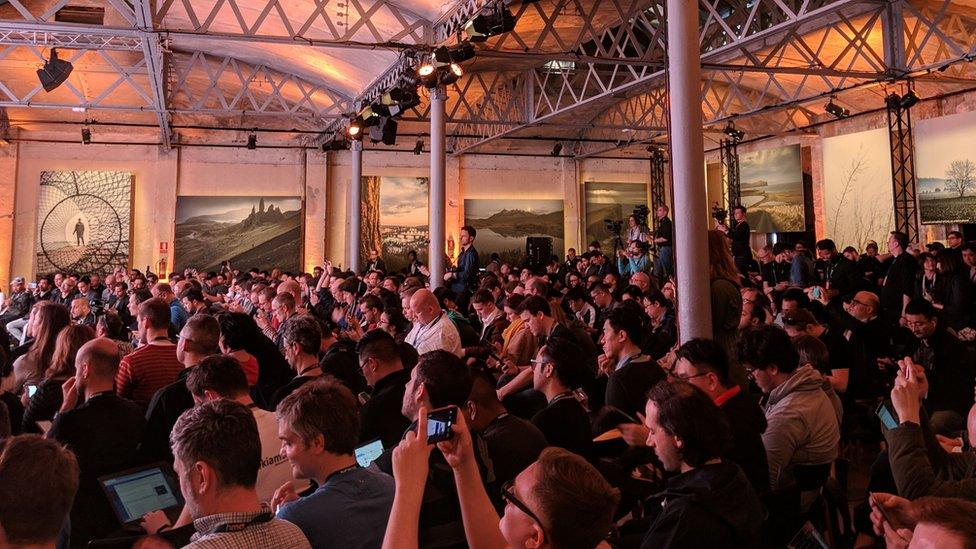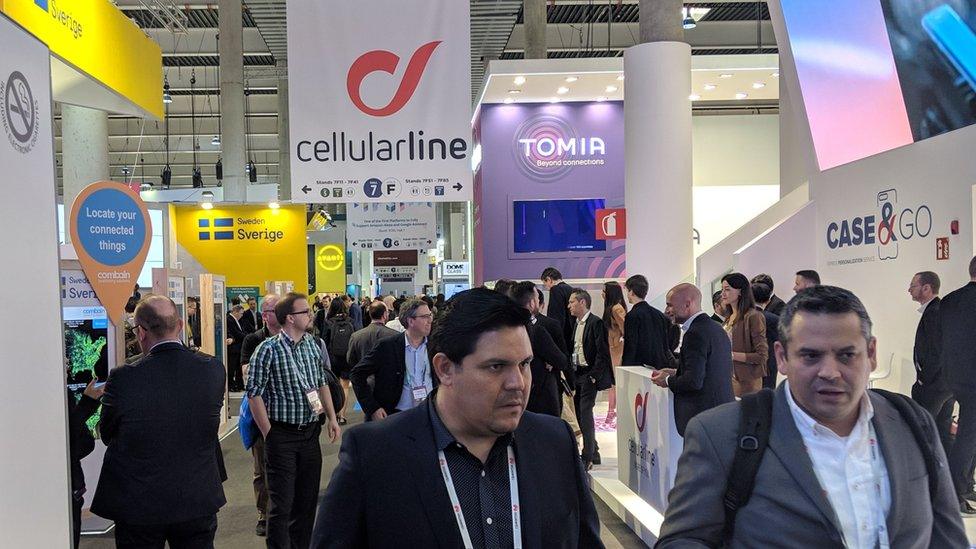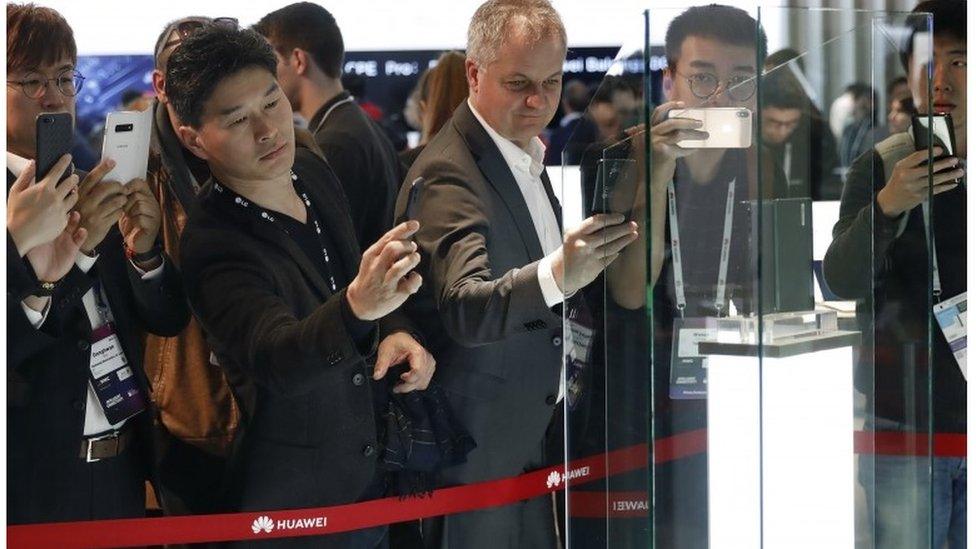Why is the MWC tech show full of men?
- Published

BBC colleagues Zoe Kleinman and Tracey Langford
As I walked into the chaotic registration zone at the hall hosting Xiaomi’s press conference, my first event of the 2019 Mobile World Congress (MWC), I soon became aware that I looked… different.
I was dressed reasonably smartly and was even dutifully wearing my delegate's lanyard just like everybody else, even though I hate it – it is too long and I had to tie a knot in it when I realised people were not admiring my belt but trying to read my name.
But, in the sea of people milling around awkwardly, waiting to collect a pass giving them access to the event, my colleague Tracey and I were two of very few women.
It was a woman who gave me my pass. It was also a woman who was pouring out glasses of wine for the reception afterwards. But there were no women speaking inside the hall during the presentation.
We left in a hurry to go to another event across town, hosted by Huawei, the brand everybody is talking about both here in Barcelona and around the world.

Once there, I looked at the long queue snaking round outside the beautiful Italian Pavilion in the heart of Barcelona. I was once again in the minority. Inside, there were no women on stage there either.
I shared a taxi to the next event with analyst Carolina Milanesi, who travels the world attending technology industry events such as MWC. It was the same every year, she told me as we chatted.
“At CES [the Las Vegas technology fair], the thing was booth babes and skimpily dressed people – that’s not the case here but women are in the position of being the hostess, they are smart and look nice but they are serving,” she told me.
“You are either sexually objectified or you are the housewife but you are not seen as making a decision about tech or buying it.”

The conference halls are also full of men
At my final event of the day, hosted by Microsoft, the organisers had clearly tried to even out the presenters, alternating men and women – although after the first four speakers, there was a succession of men before the next woman joined the stage.
On day one of the exhibition itself, I spent an hour in the priority queue to try out Microsoft’s HoloLens2. Not only was I the only woman in that line, there were only a handful in the enormous, general queue, which, I heard, was four hours long. The security guard at the front was a woman.
Around the conference halls, I found myself constantly jostled by crowds of men swarming around concept cars, robots and 5G smartphones. Meanwhile, the press officers who were constantly pinging me on email, asking me to meet their exhibiting clients were more likely to be women than men.
Claire, not her real name, is attending MWC for the first time, working for one of the major global brands.
“I have to say I am surprised by how few women there are at the event - barring of course hospitality and venue staff,” she told me
“I thought that this should be different [to other industry events] - it's much more consumer focused - but a common theme among the women I've met here is the fact that the halls are a sea of testosterone.”
She thinks some technology companies need to rethink their priorities.

Men queue up to take a picture of Huawei's foldable phone
“The industry talks a good game about being relevant to women - but it's hard to believe that for some companies it's anything more than lip service when you look around the hall,” she said.
One company under scrutiny for many reasons already is Huawei, which has a huge presence here.
In one hall, it occupies a vast space, easily the size of a supermarket. And every single delegate's lanyard bears the Huawei logo.
We arrived before its stand opened but waiting to greet people when it did were women dressed in national costumes from around the world.
Thankfully, there were no bikinis but still I couldn’t quite decide whether this was a beautiful display of global inclusivity or a cringeworthy homage to Miss World.
The million dollar question here of course is – why aren’t there more women here? It’s not like female attendees are screened out. If you’ve got the 450 euros, and/or press or analyst credentials, you can come.
A spokesman for the Global System for Mobile Communications trade body, which organises MWC, told me that in 2018 24% of the delegates had been women, a 1% increase on 2017. Over 100,000 people attend.
He also told me about the Women4Tech programme, which runs a number of events aimed at women working in and around the industry during the four days of MWC.
I love tech. I have spent years covering the subject as a journalist and I don’t feel my gender prevents me from doing so. It’s very rare that I feel actively unwelcome at an event – I don’t here either - and the days when people used to ask me who was looking after my children while I was working seem, fortunately, to be behind me.
It’s more subtle than that - and not necessarily a conscious bias. Perhaps it’s a vicious cycle - women like me come along, feel a bit like we should be serving the drinks and then decide not to return. We have to shout louder, jostle harder, raise our arms higher to get those photos.
The men I have spoken to about it seem a bit embarrassed. The women seem resigned.
An industry friend of mine told me it was one reason why she chose to avoid these events.
Don’t forget, though, women are equally expected to consume all of this technology. And if we disappear, our voices will not be heard when it comes to their design.
Here’s an example of what I mean.
At a networking event one evening, I chatted to the owner of a mobile phone company over a glass of wine. We were discussing the new trend for folding phones. And I said I would prefer one that folded out to be the size my existing phone is now.
He asked me why on Earth that was the case, so I showed him how awkwardly it fits into the pockets of my jeans. And he was absolutely astonished.
His fitted just fine, he said - he’d never even thought about it.